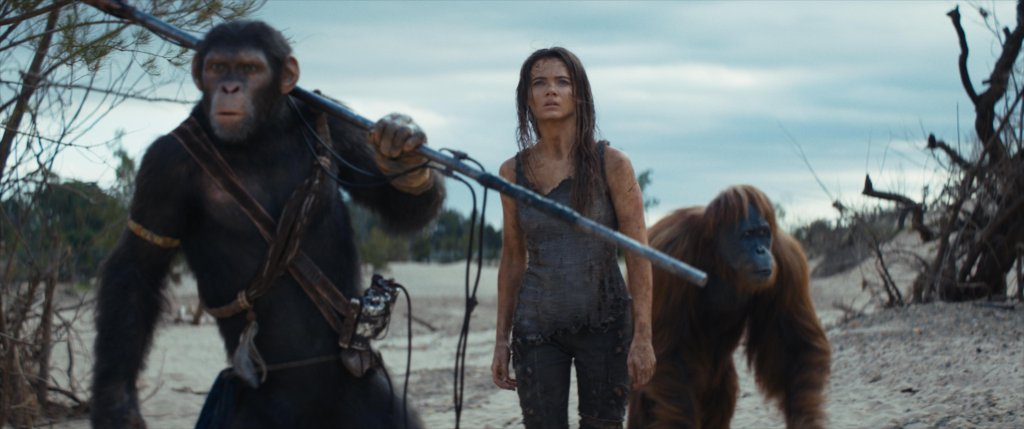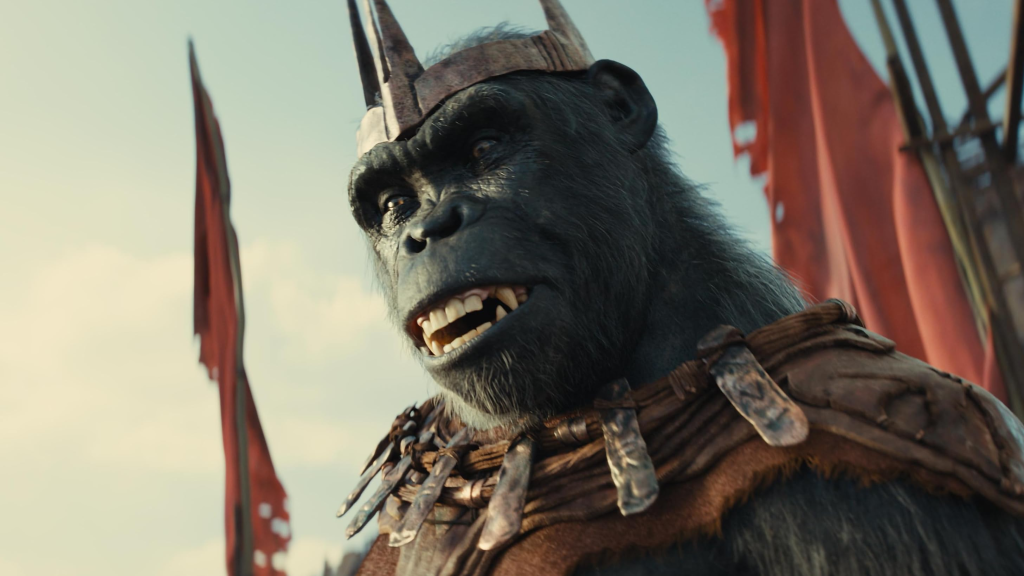I must admit, when I bought my ticket to see this movie, I wasn’t expecting to leave the theatre as conflicted as I did. I was originally upset at Kingdom of the Planet of the Apes, mainly because of its superficial treatment of character motivations and development; but this turned out to be a rare instance where I kept warming up to the movie the more I thought about it and the way it presents religion and the corruption of teachings in these apes’ world.
Kingdom of the Planet of the Apes is the continuation of the reboot Planet of the Apes trilogy—what I will from now on call the “Caesar trilogy”—exploring the evolution of the world and the ape civilization after they reached the oasis at the end of War of the Planet of the Apes. Kingdom follows Noa, a young ape on a quest for revenge, tailing a group of soldiers who, following orders from the ape king Proximus, destroy his village in search of the human girl Mae, the only one who can give Proximus and his kingdom access to weapons and relics from the human regime. The interest in revenge is soon replaced though, as the movie centers on the conflict between humans and apes, contrasting the human’s reticence to lose dominance over the planet and the apes’ quest for the knowledge and power humans once wielded.

This movie starts immediately after Caesar’s death, and the first important change we notice from the previous movies is the absence of Caesar himself. The previous trilogy revolved entirely around him, so it makes sense for this new iteration to separate itself from the character and instead focus on the repercussions of Caesar’s actions on the world. However, his development as a character and his role as warrior and leader left such a profound impact on me, because of his dedication and abnegation to his people, that characters like King Proximus or Noa fall short in comparison. Not only do they not have the same charisma and screen presence Caesar did, but their overall characterization and development feel shallow at times.
However, whereas the lack of an imposing protagonist might be considered by some as a shortcoming, it’s in fact one of the movie’s biggest strengths. And this is because of the overarching theme of this movie: the corruption of teachings. The lives of both Proximus and Noa are overshadowed by the ghost of Caesar, to the point that his early teachings are constantly affecting our characters’ goals and motivations. Caesar’s words remain a powerful force in this new world, and yet they are continually used by several characters for their personal benefit: Proximus uses them as an excuse to justify his legitimacy as a ruler, to the point of ignoring Caesar’s actual commandments, and Noa uses them as an excuse to incite rebellion and reclaim his clan’s freedom. In this way, the movie’s success and the impact of its message don’t depend on the charisma or the construction of a single character, but instead on constantly bombarding the audience with its stance on authority and religious tradition—an unexpected but not entirely unpleasant surprise.
This focus on the authority of tradition is not without its problems, though. Since the movie takes a more introspective approach to the question of religious evolution, the development of certain scenes takes longer than needed, creating some pacing issues. Noa and his friends’ introduction as they hunt for eagle eggs is a good example, unnecessarily lengthened based on its importance for character building. Moreover, the understanding of our characters’ world and heritage is neglected in favour of an exploration of the evolution of religion. The most evident example is that of Noa’s tribe and their culture. We discover early on that they have become eagle tamers, and a character’s early death even shows us they developed burial rituals, but we only encounter these elements at the most superficial levels, and they are never brought up again. Similarly, having a metropolis overcome by nature is an excellent setting masterfully used in other science fiction stories, but only used here to house a plot device (the telescope that hints at Mae’s intelligence and raises questions in the apes) and is never revisited.
The characters also suffer from underdevelopment, as they become mere vessels embodying the different perspectives on these themes, rather than individuals in their own right. Mae, Noa’s friends, and most of the apes all feel one-dimensional, doing what they do because it’s what their character is supposed to do to showcase the conflict. The only exception to this rule, and the only character who presents some nuance, is Proximus. His desire to achieve ape domination of the planet using Caesar’s words without necessarily respecting them is an interesting concept that kept me invested in his story. It is his interpretation of these commandments that fuels his fear and hatred toward humans, pushing him into actions that would have appalled Caesar. The beauty of it, however, is that the movie presents these fears as not completely irrational, leaving the audience to ponder how much of Proximus’ selfishness and hypocrisy is caused by a mere desire for power, and how much of it derives from a genuine concern for his species.

The one thing I genuinely dislike about this movie, however, is its repetition. Since the Caesar trilogy acts as a retelling of his myth and the development of an ape civilization hinted at in the original films Conquest and Battle for the Planet of the Apes, it makes sense for this new movie to address the same themes — namely, the inevitable failure of a human-ape society, given humankind’s refusal to be dominated by a race they consider inferior. However, Kingdom doesn’t add anything we haven’t already seen in Dawn of the Planet of the Apes; the fragility of such a society is thoroughly and satisfactorily explored in this second entry of the Caesar trilogy, so this whole conflict feels redundant here. A full commitment to the theme of corruption of moral teachings would have made a far more interesting story, where we might see large groups of apes disagreeing over the interpretation of Caesar’s commandments and maybe even fighting each other over it, rather than another unnecessary clash between humans and apes.
I don’t want readers to finish this review thinking Kingdom of the Planet of the Apes is not worth watching. Despite being an ultimately redundant addition to the saga, it has enough strong points to make it an enjoyable cinematic experience. The movie explores the (un)intended corruption of moral and religious values and teachings over many generations, a path previously ignored in the franchise, but it does so at the cost of other important elements that make it fall short of being a fully recommendable movie. In any case, it has piqued my interest. The producers will surely keep going down this line for the next chapter in the apes’ story, so I will remain here, observing. After all, any time a franchise manages to build properly upon the foundation of its predecessors is cause to exclaim, “What a wonderful day!”
